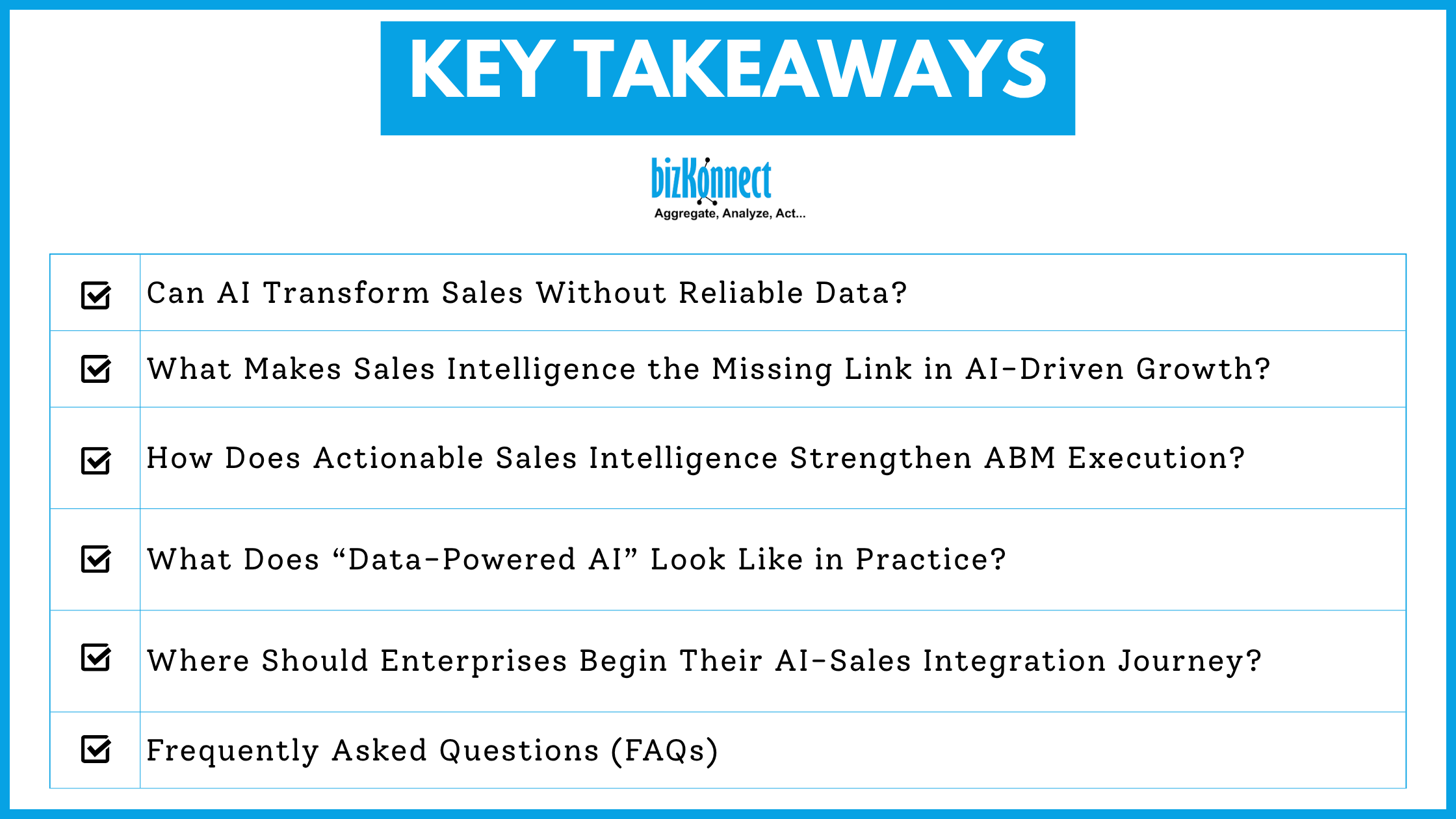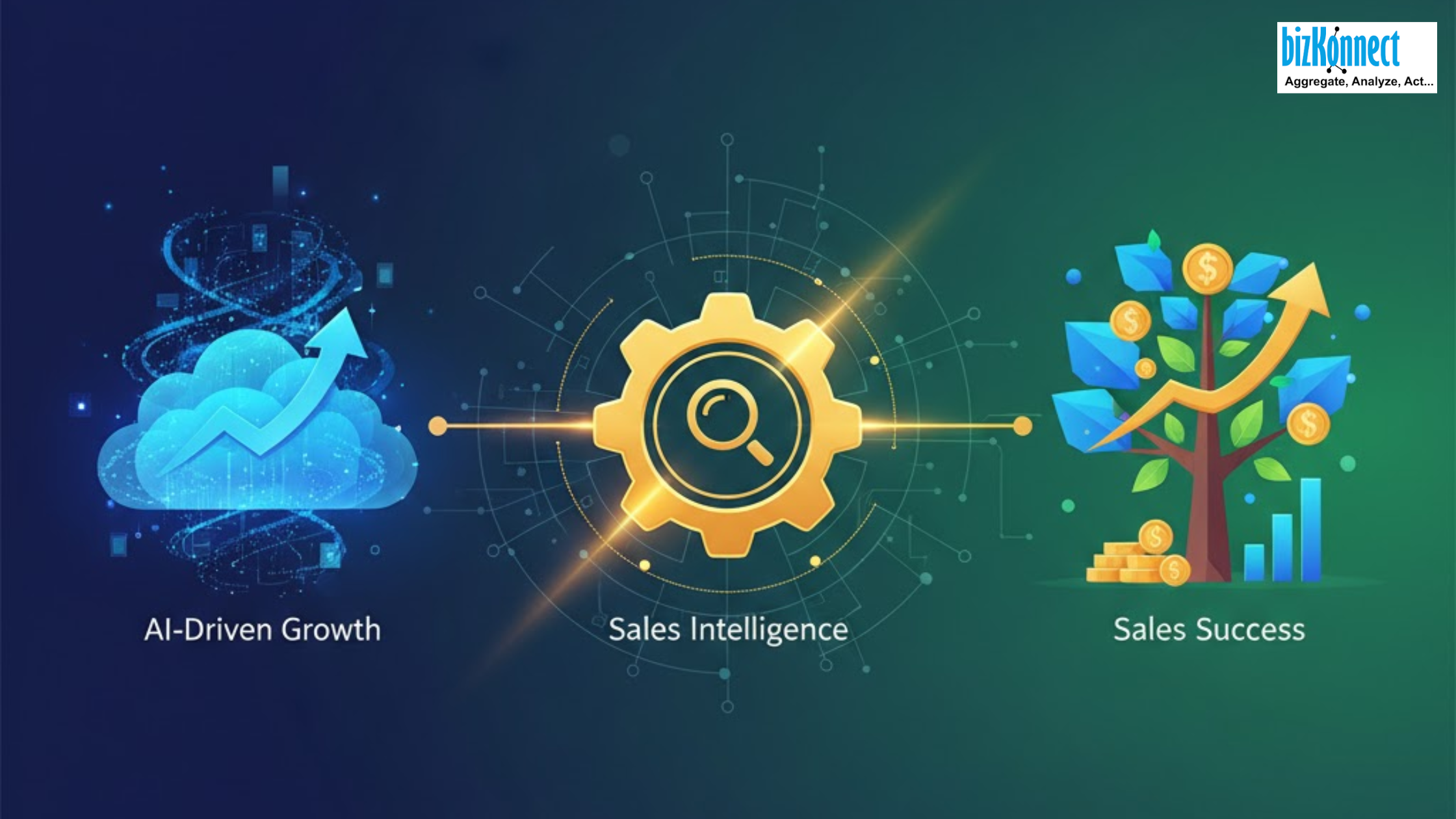Since the conversation has shifted across boardrooms, the question is no longer whether to use Artificial Intelligence (AI), but how to make it deliver real results.
From chatbots and assistants to automated CRM systems, enterprises have invested billions in AI tools, expecting breakthroughs in sales productivity and customer engagement. Yet, nearly 95% of companies have seen no measurable bottom-line impact despite spending an estimated $40 billion on AI initiatives.
The reason is nothing but the foundation that feeds AI: Data Quality. Without reliable and context-rich data, AI becomes a high-cost experiment rather than a growth engine. And in sales-driven organizations, that foundation begins with actionable sales intelligence. It delivers data that connects accounts, decision-makers, and buying signals into a single, adaptable system.

When powered by verified Go-to-Market (GTM) data and continuous intelligence, AI can finally do what it promises: help sales teams prioritize accounts, personalize engagement, and execute Account-Based Marketing (ABM) strategies efficiently.
Can AI Transform Sales Without Reliable Data?
Not quite. AI is only as intelligent as the information it learns from. When enterprise systems depend on incomplete or outdated data, the AI behaves much like an intern given the wrong brief who is confident but misdirected.
According to a recent report, more than 40% of AI users reported dissatisfaction with their AI tools’ reliability and accuracy. The issue is not the algorithm but the data feeding it. To drive business outcomes, AI must adapt, remember, and evolve. And, it is possible only when sales data is verified, contextual, and continuously refreshed through B2B data enrichment and sales intelligence.
Modern GTM teams achieve this by integrating large-scale business knowledge graphs that cover millions of companies globally. These data layers include organizational hierarchies, role connections, and firmographic insights, providing AI with a rich foundation for account prioritization and precise segmentation.
What Makes Sales Intelligence the Missing Link in AI-Driven Growth?
Sales intelligence provides context, the one thing generic AI tools often lack. While most CRM systems capture static contact information, sales intelligence systems go further by connecting data across multiple layers: company hierarchies, technology usage, buying intent, and engagement behavior.
Besides, dynamic org charts powered by sales intelligence can map decision-makers, influencers, and key stakeholders within target accounts. By visualizing relationships and identifying strategic entry points, AI systems gain the context necessary to recommend personalized outreach and engagement strategies.
When this intelligence is embedded into AI workflows, it enables adaptive decision-making. Sales teams can see which accounts are in-market, which personas are showing active intent, and where engagement efforts should concentrate. The result is not just more data, but better direction.
For example, top-performing GTM teams that combine AI-driven insights with sales intelligence report 5x revenue growth and 2.5x higher valuations than peers that rely on standard CRM data. These results highlight the power of actionable and continuously enriched data in transforming AI from a reporting assistant into a strategic sales partner.

How Does Actionable Sales Intelligence Strengthen ABM Execution?
Account-Based Marketing succeeds when every interaction feels specific, timely, and relevant. But to reach that level of precision, marketing and sales need an intelligence layer that recognizes patterns across the buying journey.
With actionable sales intelligence, teams can:
- Prioritize accounts based on verified intent, firmographics, and engagement signals.
- Personalize outreach using insights about buying roles, technology adoption, and pain points.
- Execute ABM campaigns supported by automated lead scoring, campaign management, and targeted email workflows.
In essence, AI becomes the executor and sales intelligence becomes the strategist, guiding the ABM toward outcomes that matter.
What Does “Data-Powered AI” Look Like in Practice?
The most effective AI systems embed CRM and marketing automation integration, allowing teams to access enriched company and contact data within existing workflows. This ensures recommendations and actions are executed without gaps or duplications.
Additionally, AI can leverage virtual assistant-like workflows that support lead qualification, engagement prioritization, and continuous learning from user outcomes. This combination of structured data, automation, and adaptive learning creates a self-improving sales engine that drives real impact.
By merging AI with continuously enriched B2B data, organizations move beyond automation into adaptation. AI learns from each outcome, continuously improves, and powers sales motions with confidence.
Where Should Enterprises Begin Their AI-Sales Integration Journey?
Start with the data. Before adding another AI system, companies must evaluate the accuracy, coverage, and freshness of B2B data. Investing in actionable sales intelligence that unifies GTM insights ensures that every AI application like lead scoring, opportunity management, or outreach operates on reliable inputs.
Comprehensive business knowledge, combined with org mapping, workflow integration, and targeted campaign insights, creates the foundation AI needs to remember, adapt, and evolve. In the end, it delivers measurable sales impact and sustainable growth.
Now, Let’s Look Into Some Frequently Asked Questions (FAQs)
1. Why do most AI investments fail to impact the bottom line?
Many AI deployments rely on incomplete, outdated, or generic data. Without verified GTM insights and actionable sales intelligence, AI cannot prioritize the right accounts, personalize outreach, or adapt to real business contexts.
2. How does high-quality GTM data improve AI outcomes in sales?
Accurate, enriched B2B data ensures AI systems make informed decisions. It helps sales teams identify the right accounts, engage the right personas, and execute ABM strategies effectively, turning AI from a tool into a growth driver.
3. Can AI alone drive measurable revenue growth?
No. AI requires context-rich, actionable data to generate results. When combined with verified sales intelligence, AI can adapt, remember, and evolve with each engagement, amplifying sales effectiveness and pipeline growth.
4. Which areas of sales see the most impact from AI powered by verified data?
Account prioritization, personalized outreach, renewal management, and ABM execution see the strongest benefits. These areas rely on continuous, enriched data for AI to make timely and accurate recommendations.
5. How does enriched B2B data support AI-driven sales strategies?
By integrating organizational hierarchies, decision-maker mapping, automated lead scoring, campaign insights, and workflow-ready contact data, AI systems operate on verified and contextual information. It enables precise targeting, personalization, and adaptive decision-making.
See what high-conversion contact data looks like. Get a free sample from BizKonnect.